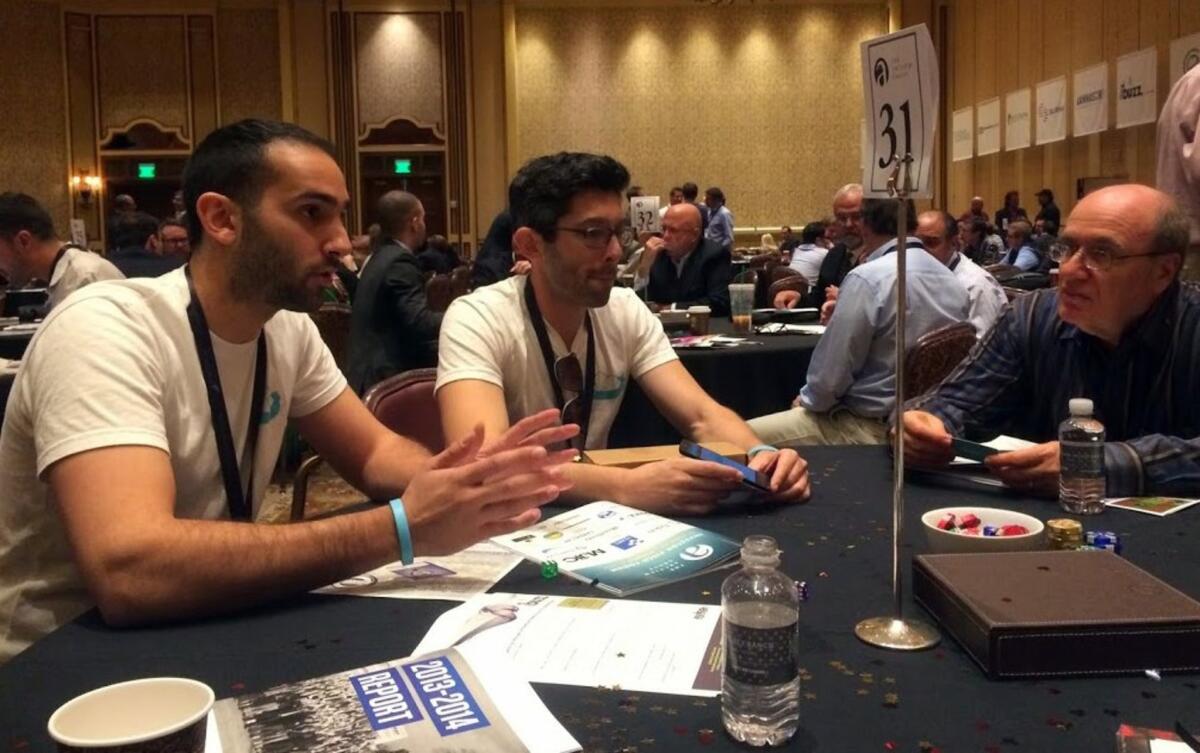Cannabis hedge funds join the green rush

Reporting From HENDERSON, Nev. — The frenzy in the cavernous Green Valley Ranch Resort ballroom might have passed for any confab of entrepreneurs pitching their business plans to pokerfaced angel investors — until an organizer took the podium for a public service announcement.
Please stop smoking weed out by the parking lot, he implored. Hotel security did not approve.
The gathering last week of several hundred Wall Street types, tech industry disrupters, agricultural enthusiasts and assorted others shrugged and went back to the business at hand: leveraging the legalization of marijuana into a windfall.
The pot business is exploding. The devotees and Deadheads toiling away since states started legalizing medical marijuana nearly 20 years ago now must compete in a radically different business culture.
The rapid spread of laws permitting recreational pot is enticing hedge fund managers, venture capitalists, software developers and many others to get in on what inevitably is being touted as a green rush.
They are particularly motivated after Oregon, Alaska and Washington, D.C., this month joined Colorado and Washington state in legalizing recreational pot, with California and others girding to follow in 2016.
“There is a massive potential,” Emily Paxhia, who co-owns one of the new pot hedge funds, Poseidon Asset Management, told the gathering. “It is untapped. It is just sitting there below the surface and it is ready to come above ground.”
The inventiveness of the new entrepreneurs was on full display here at the “shark tank” conference organized by the ArcView Group, a San Francisco firm that helps deep-pocketed investors find promising cannabis startups.
Humboldt County, meet Silicon Valley.
Several entrepreneurs armed with PowerPoints had gotten involved only months ago. They included data wizards who talked of “disrupting” the industry with apps to make ordering God’s Gift or Fogg Kush for home delivery as hassle-free as buying dinner on GrubHub, the online food delivery service.
A former NASA scientist hawked next-generation grow technology. Plans for a cannabis soda that promoters said could be as ubiquitous and consistent as Coca-Cola were unveiled, as were plans to open “the nation’s first private membership [country] club to support the cannabis lifestyle.”
Hallway chatter was rich with talk of convertible notes, rates of return, incubators and other investor jargon.
By late afternoon, everyone stopped working and engaged in a group yoga stretch.
“It is important we acknowledge the relentless work we have been putting our bodies and our minds through,” said Jessica Dugan, who led the session. “In order to maintain our sector’s growth, it is important to have some kind of mindfulness practice.”
But it was all business when pot market analyst Patrick Rea unveiled the first “seed-stage mentorship-driven accelerator” for fledgling cannabis-related firms.
Those who cared to fund the program were promised a stake in each of the dozen or so startups it guides through a three-month boot camp in Boulder, Colo., and infuses with $20,000 cash.
“We will surround them with mentors, pressure test their business plans and help them get their financials in order,” Rea said.
With all the regulatory and political uncertainty around marijuana, it is one of the riskier sectors in which to launch a company.
But you wouldn’t know that talking to John Strickler, a longtime management consultant in established industries who decided three months ago to move his career to cannabis. Now he works for Ebbu, a Denver startup seeking to parse the chemical components of pot with unprecedented precision.
“What we are trying to do is create different feelings depending on what mood you want to be in and how you want to feel,” he said. “We have an ‘energy,’ a ‘create,’ a ‘bliss,’ a ‘chill’ and one other one. What was it? Oh yes, ‘giggle.’ How could I forget ‘giggle’?”
The “artisanally distilled” feelings would be sold in the form of liquid vapor, dissolving strips “similar to Listerine strips,” gel caps or pre-rolled joints.
“Want to stay out late with your friends?” an Ebbu brochure asks. “We have an Ebbu for that. Want to focus on creative pursuits? There’s an Ebbu for that too.”
During the conference, entrepreneurs buzzed from table to table in several rounds of “speed dating” with some 200 members in the ArcView network, each of whom pledges to invest at least $50,000 in the pot startups.
Most stuck around for a few days to attend the colossal Marijuana Business Conference & Expo at the Rio resort off the strip in nearby Las Vegas, where 142 companies promoting products such as Peanut Budda Buddha cannabis candy bars and FunkSac child resistant pot pouches tried to lure business.
Some of the more popular booths were staffed by models in slinky dresses. More than 3,000 people attended. Last year’s conference drew 700 people.
Not everyone is on board. Pot critics say the thirst for high returns has the marijuana industry starting to resemble Big Tobacco, with profit-hungry companies using the kind of marketing imagery and sales tactics that entice children and glamorize drug use.
Regulators are also concerned. In Washington state, officials banned nonresidents from investing in pot businesses — though some have already found workarounds, such as having out-of-state partners spin off into separate companies that lease real estate back to their colleagues permitted to work directly with the pot.
There was no shortage of ambition at the conference. There was, though, a scarcity of diversity.
Social justice activists bemoan that after decades in which minorities were jailed at astoundingly lopsided rates for using and selling pot, the money to be made in legalized marijuana seems to be headed toward affluent whites.
“There are no Hispanics here,” said investor Silvia Orizaba, a rare exception. “It’s all whites. So I have to invest with the whites.”
Orizaba, a Chicagoan who says she has invested nearly $5 million into cannabis-related companies since 2008, is seeking to draw more Latinos into the business through a nonprofit she runs.
“This industry has gotten so far,” she said. “But we need to get minorities involved to move further.”
ArcView’s founders, whose involvement in the cannabis business predates the days when there was big money to be made, are struggling to keep the new players focused on the political and social concerns that drove legalization and spawned the industry.
They implored investors to pledge big donations to several advocacy groups that gave presentations at the conference. The response was fairly muted.
So by late afternoon, ArcView cofounder Troy Dayton tried a more direct appeal. Help these groups with their political campaigns, he said, and maybe next time you come to Nevada you won’t have to worry about being arrested for lighting up in the hotel parking lot.
Said Dayton: “That is another reason to make sure you donate to legalization.”
Twitter: @evanhalper
More to Read
Sign up for Essential California
The most important California stories and recommendations in your inbox every morning.
You may occasionally receive promotional content from the Los Angeles Times.











